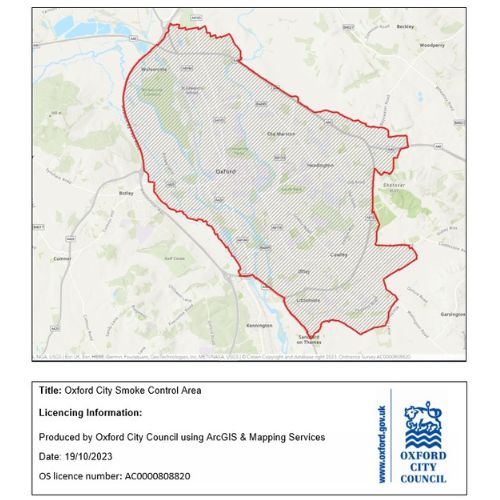From 1 December 2024, the entire city of Oxford is in a Smoke Control Area (SCA), expanding the area previously covered by separate Smoke Control Areas. This changes the way that the way that homes and businesses can legally use wood burners, open fires and solid fuel.

What is a Smoke Control Area?
In the 1950s local councils were granted powers under the Clean Air Acts, to tackle air pollution by creating Smoke Control Areas in parts of their administrative areas.
Oxford's first Smoke Control Area was introduced in 1958 - six years after the Great Smog of London, which covered the capital for five days and resulted in some 12,000 deaths.
In a Smoke Control Area, legislation is in place to reduce the amount of chimney smoke from burning wood, which is the main source of indoor air pollution and harmful particulate pollution (PM2.5).
In a Smoke Control Area:
- you cannot release smoke from a chimney
- you can only burn authorised fuel, unless you use an appliance approved by Defra (also known as an ‘exempt appliance’ or ‘Defra approved appliance’)
You may have to pay a penalty of up to £300 if your chimney releases smoke in a smoke control area.
You can be fined up to £1,000 if you buy unauthorised fuel to use in an appliance that’s not approved by Defra.
What does this mean for Oxford residents?
If you live inside a Smoke Control Area and use a wood burner, you will still be allowed to use it as long as your appliance is included on the list of exempt appliances on the Defra website for use within Smoke Control Areas. If you think that your wood burner is compliant, but it is not listed as an exempt appliance, then call Defra's helpline for confirmation.
If your appliance is not exempt, (or you use an open fire) you should use smokeless fuel (anthracite, semi-anthracite, gas, low volatile steam coal), or an authorised fuel listed on the Defra website.
What does this mean for businesses?
All businesses located inside the city area, also come under the Smoke Control Area rules.
In addition, if you are a fuel manufacturer, importer or distributor selling fuel for domestic use in England, you need to follow rules which came into force in May 2021 to sell fuels legally.
More information on selling fuel in a Smoke Control Area is available on DEFRA’s website.
Outdoor ovens, burners and barbecues
Inside a SCA, you can still use outdoor barbecues, chimineas, garden fireplaces or pizza ovens, as long as these appliances do not release smoke through a chimney of a building - for example a summerhouse, otherwise they will only be able to burn authorised fuel or must be exempt. You are allowed garden bonfires in SCAs, as long as you follow the rules on bonfires described on our Bonfires page.
Moored vessels such as canal boats are also exempt from the Smoke Control Area rules.
Why does Oxford need to be a Smoke Control Area?
Burning wood and coal in non-Defra approved fireplaces is very inefficient and releases smoke containing harmful particles (PM2.5), which are dangerous to health. These particles can affect every organ in the body and increase the risk of serious illnesses such as lung disease, heart disease, and cancer. Children are especially vulnerable, as exposure can also stunt lung growth and affect development.
Burning of wood and other non-approved solid fuel - which has increased in recent years – contributes to 27% of national particulate pollution emissions.
Smoke Control Areas help reduce this harmful pollution by restricting the use of solid fuel to only those appliances, such as approved wood stoves, which can burn them without causing smoke.
Report a problem
To report pollution in a Smoke Control Area, or if any kind of smoke from neighbouring buildings or land is causing you problems, you can use our online form.
Enforcement
The current penalty for emitting smoke from a chimney is a Fixed Penalty Notice of between £175 and £300.
The penalty for selling an unauthorised fuel within a Smoke Control Area is a fine of up to £1000.
Advice on SCA authorised appliances and fuel, and how to burn fuel efficiently
- DEFRA guidance: List of approved wood burning appliances for use in SCAs
- Guidance from DEFRA: List of authorised fuels for use in SCAs
- Best practice for using wood burning stoves
Grants and Support
There are several ways that you can access help, even if you don’t have a wood burner or an open fire:
- Better Housing Better Health provides expert advice on how to improve energy efficiency in your home to keep you warm, well and save money.
- Do You Fuel Good? is a campaign, which highlights the best practice, and advice to reduce the health impacts of particulate pollution inside your home.
- Free grant funding may also be available to help with the cost of making your home warmer in winter. If you live in a cold home, are in receipt of certain benefits, are on low income or have certain health conditions, then you may be eligible for a grant.
Timeline
- 1958: First Smoke Control Areas in Oxford introduced
- January 2021: Publication of Oxford’s Air Quality Action Plan 2021-2025 which includes plans to review Oxford’s Smoke Control Areas
- September 2023: Cabinet approves plans to expand Oxford’s Smoke Control Area, subject to public consultation
- December 2023-January 2024: A public consultation is held from 4 December 2023 - 31 January 2024
- March 2024: A formal application to expand Oxford's Smoke Control Area submitted to the Secretary of State
- May 2024: The Council's application to expand Oxford's Smoke Control Area approved by the Secretary of State
- 1 December 2024: Expanded Smoke Control Area introduced

